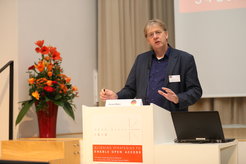Germany's Journey Towards Open Access
An Interview with Prof. Dr. Gerard Meijer, FHI
The scientific community in Germany is resolutely pursuing the goal of transforming the academic publishing system from a subscription-based system, in which publications are locked behind a paywall, to a system where there is Open Access (OA) to scientific publications. In a conversation with Prof. Dr. Gerard Meijer, Director at the Fritz Haber Institute of the Max Planck Society, member of the German Council of Science and Humanities ("Wissenschaftsrat") and vice-speaker of the DEAL-consortium, the significance of Open Access and of the recently signed agreements between the DEAL consortium and the major publishers Elsevier, Wiley and Springer Nature are discussed.
On occasion of the recent DEALagreements with Elsevier, Wiley, and Springer Natured, the Fritz-Haber Institute published an interview with Prof. Dr. Gerards Meijer, Director of the Department of Molecular Physics, who is vice-speaker of the DEAL-consortium.

As the reader does no longer have to pay to get access to the scientific publications, the costs of publishing need to be covered otherwise, either by the author, i.e. by their employer or their funding agency, or by a third party. Prof. Meijer quotes a statement from the German Council of Science and Humanities, namely that
„dissemination of scientific results of a research project is an integral part of that research project, and those who fund the research should also fund the publication."
In the interview, Prof. Meijer explains that „in Germany, publications account for approximately 1-2% of research costs, which thus need to be part of the research funding. It is important, however, that finance streams are organized such, that Open Access does not mean an extra (financial) burden for the authors; library budgets used in the subscription era to pay for reading access need to be repurposed to pay for the costs of publications in the OA era. Within the MPG, the costs of OA publications are centrally covered in exactly this way, and this has been an important blue-print for the DEAL agreements."
